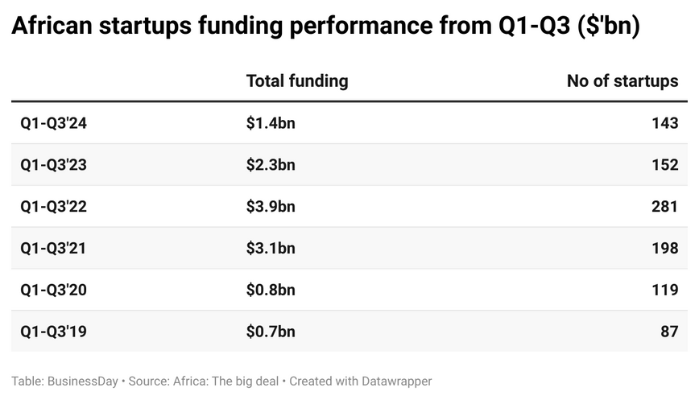Funding, consisting of debt and equity, into the African startup space, decreased by 38 percent to $1.4 billion in the first nine months of 2024.
This underscored the consistent drop in venture capital funding on the continent, which fell from $2.3 billion raised in the same period of 2023, according to Africa: The Big Deal.
The data insight company that tracks funding of $100,000 and above said, “While total funding raised ($1.4 billion) compares favourably to pre-heatwave levels (2020, 2021), it falls short when looking at the past three years. So far this year, African start-ups have raised 38 percent less funding compared to the same time last year. On the positive side, the number of start-ups raising $1 million or more has only slightly declined (-6 percent YoY).”
In Q1, African startups raised $0.5 billion in funding, $0.3 billion in Q2, and $0.6 billion in Q3. In terms of the number of startups that have raised funding, 143 startups raised funding from different sectors from Q1-Q3 ‘2024. This is a 6 percent drop from 152 startups that raised in 2023 and a 64 percent rise from 87 startups that raised in the same period of 2019.
The company noted that start-ups could raise more in 2024 than in 2023, but this would require them to raise more in Q4 than in the first three quarters combined. While this almost happened in 2019, it hasn’t been a recurring trend.
“In 2024 so far, African start-ups have raised around $920 million in equity, matching 2020 levels but falling short of 2021, 2022, and the first three quarters of 2023 (-32 percent YoY). Nearly $800 million would need to be raised in Q4 for 2024 to match 2023, a level not seen since Q2 2022,” it stated.
Read also: African startups raise $1bn in seven months — Report
Here are some of the key trends shaping the startup landscape in 2024:
Kenyan startups overtake African peers

From Q1 to Q3, Kenya raised the most funding in Africa, followed by Egypt, Nigeria, and South Africa.
Africa The Big Deal noted that Kenya led with $437 million among the Big Four, Egypt raised $373 million, Nigeria had $218 million, and South Africa had $125 million.
It said, “Kenya ($437 million, 31 percent) and Egypt ($373 million, 27 percent) come out on top again with a combined 58 percent of all the funding raised on the continent in 2024 so far. For both of them, it is their highest share of funding on record since 2019.
On the opposite side, it means that the other two ‘Big Four’ peers are rather underperforming. Nigeria’s share (15 percent, $218 million) is comparable to what it was last year (14 percent).”
With 9 percent ($125 million) of the funding raised in 2024 so far, South Africa is currently recording its worst performance since 2019 in terms of its share of continental funding (6 percent), much below its average share in the past few years (18 percent between 2020 and 2023).
Apart from the big four, only 18 percent of the funding has gone to the ‘rest of Africa’ with 23 markets recording at least one $100k+ deal since January 1st.
It added that only five of them—Tanzania, Ghana, Morocco, Uganda, and Rwanda — have claimed at least 10 such deals since the beginning of the year.
Fintech leading the pack

According to Africa: The Big Deal, the fintech sector attracted the highest funding from the first to the third quarter of the year, totalling $600 million.
It said, “Fintech remains in the lead ($600 million, 43 percent), followed by Energy ($300 million, 21 percent), though combined they ‘only’ represent 64 percent of all the funding invested in start-ups on the continent.
“Logistics & transport comes third, driven by the Moove ($110 million) and Spiro ($50 million) deals of the first half of the year while Agric and food came fourth with $82 million.”
It also highlighted that in Q3, fintech ($363 million and Energy ($199 million) attracted nearly 90 percent of all funding for African start-ups.
Funding by gender of the CEO

Africa: The Big Deal analysed that funding raised by female chief executive officers from Q1-Q3 amounted to $63 million, five percent of the total funding secured in 2024.
However, male counterparts accounted for 95 percent ($1.4 billion) of funding raised.
The company said, “Last but not least, we always look at numbers with a gender lens, hoping that we’ll find signs of improvement. Unfortunately, there aren’t any reasons to celebrate here. In 2024, less than 5 percent of the funding has gone to start-ups with a female CEO, vs. 5.6 percent between 2019 and 2023, so no improvement.”
